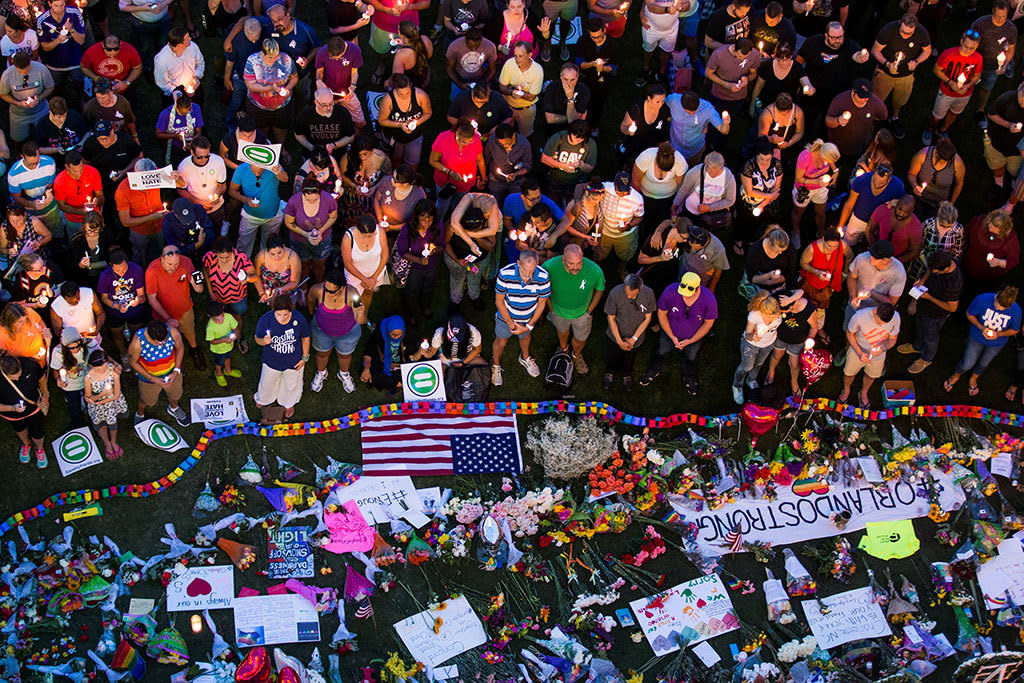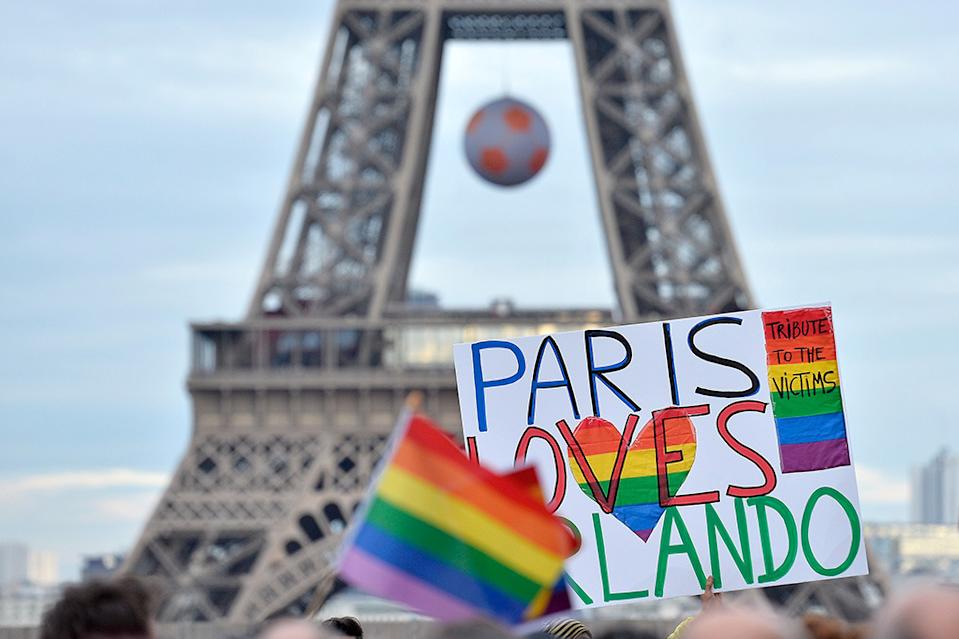How Does a Community Move Forward After One of the Worst Tragedies in American History?

Thousands gather at the Dr. Phillips Center for the Performing Arts in Orlando, Fla., to pay their respects for those lost in the Pulse nightclub shooting. (Photo: Samuel Corum/Anadolu Agency/Getty Images)
Cities can leave indelible impacts. For New York City, you might think of Broadway, Central Park, and Times Square. For Boston, it’s the marathon, the harbor, and the Red Sox. For Paris, you think of the Eiffel Tower, the Louvre and Notre Dame.
But this is the 21st century. Mass shootings, bombings, and terrorist attacks now mar our cities, leaving painful scars. Most of us will never forget the burning Twin Towers in 2001, the chaos at the Boston Marathon finish line in 2013, nor the fear after the coordinated strikes in Paris this past November.
On June 12, 2016, Orlando became the latest addition to an ever-growing epidemic of locations marked by tragedy; we will now remember the looks of shock on the faces of the men and women spilling out of Pulse nightclub, in the heart of a city known for Disney World and sunshine. As a country, this tragedy hits hard. As a city, this event will hit Orlando even harder.
Po Murray is chairman of the Newtown Action Alliance, an organization founded in the wake of the mass shooting in 2012 to educate the public and address the devastating impact of gun violence. Quiet, suburban Newtown, Conn., has been in Orlando’s shoes. Most of us did not have the city on our radar until December 2012, when 26 people were killed at Sandy Hook Elementary School. Now, we’ll never forget. The sleepy community was forever marked.
Related: In Orlando, the ‘Happiest Place’ confronts a sad reality
“The shooting was a huge shock to the system, and Orlando will feel this, too,” Murray tells Yahoo Beauty. “Watching on CNN, you can’t even imagine how this happened. You can visualize the place it happened; many parents here knew Sandy Hook. They sent their kids there. You can see the hallways in your mind.”
On Sunday, the Newtown Action Alliance held an impromptu candlelight vigil in front of the National Shooting Sports Foundation, just three miles from Sandy Hook. “We wanted to show Orlando we are with them, and demonstrate to America that without sensible gun laws, this will keep happening,” says Murray. “We wanted to take some kind of action immediately, as the best way to honor those impacted most severely.”
Just after a massive trauma, it’s important to connect the surrounding community to many means of support, says Gary Belkin, MD, executive deputy commissioner of the New York City Department of Health and Mental Hygiene. “In New York, we’ve certainly had our fair share of shocks and tragedies,” he said to Yahoo Beauty.
Related: Orlando nightclub gunman seen as self-radicalized
Belkin says healing will start with behavior modeled by Orlando’s leaders. “Especially because it appears a very particular group was targeted,” he says. “This is where leadership is really important for community healing, inclusion, tolerance and respect. … They will need good, large-scale counselors to normalize the environment and take focus away from some narrative or another of fault.”

A woman pauses while writing the names of shooting victims in chalk in a park across from The Stonewall Inn in New York City. (Photo by Spencer Platt/Getty Images)
With such an unexpected event, Belkin suspects the Orlando community is a bit shaken. “The closer you are to what happened, the initial reaction is often fear,” he explains. “It challenges all your implicit views of safety, and the everyday pieces of your life feel less secure.”
Murray says the reaction in Newtown around December 2012 was similar. “Kids ride bikes here,” she says. “We walk our dogs. You would never imagine a mass shooting could happen in your neighborhood.”
Belkin says that it isn’t uncommon for a community to be somewhat traumatized. “They may experience symptoms like ruminative worry or reenacting the event mentally, especially if someone they love was involved,” he explains.
Related: This Is What It’s Really Like to Have Anxiety
In these cases, Belkin encourages people to reach out for the help of a mental health professional. But in cases of normal, natural fear after a shooting, social support can be incredibly powerful. “It can often do more than a clinician,” says Belkin. “If you are a leader of a local group or church, you can do a lot to normalize the environment,” he says. “Citizens should use all their social ties, whether it be a community group, or even Facebook.”
Connectivity helps many, but there’s no one-size-fits-all way to cope with a community tragedy that is in the national spotlight. Most of us haven’t forgotten the images flooding the media after Newtown: the scores of students streaming out of the school in straight lines; the president shedding tears for the young victims during his national address. When it’s your city, the healing process is complex and individual. “Depending on who you are, people go about it in different ways,” Murray explains. “Some are quiet; others volunteer.”
Murray says that Orlando will have many needs in the aftermath of Sunday’s shooting. In addition to mental health services and counseling, as well as physical care for the wounded victims, the community will need all hands on deck (and extra help) to deal with media communication, donations, policy changes, and activism efforts, as well as helping the families of the victims and the survivors.

People gather in front of the Eiffel Tower in Paris for a vigil for victims of the Orlando, Fla., nightclub shooting. (Photo: Aurelien Meunier/Getty Images)
All volunteers are welcome and helpful in Orlando. “At the same time, as you’re dealing with all this, so many are in the process of healing,” Murray says, so all community members may not be able to step in and help. “It is a huge economic cost to a take care of a community after a loss like this, and the emotional responses are so mixed.”
Murray encourages the citizens and families in Orlando to reach out for social support within the city; she says community outreach has really helped many to cope with the helpless feeling in the wake of a huge tragedy. “It may feel like there is not enough support, but I would imagine there will be many opportunities for activism and change,” she says. “If you seek it out, you will find it.”
Related: Possible motives emerge for club gunman as Orlando mourns
Newtown is still grieving and recovering, Murray explains. She expects the people of Orlando will need time and emotional support, in addition to financial help and volunteers. “There are different methods of healing for all,” she says. “The pain of an event like a mass shooting runs deep. Many still have PTSD [post-traumatic stress disorder]. Healing will take a long time. We are moving forward, but we cannot move on.”
Murray says that most Newtown citizens expected Congress to take “meaningful action” to prevent gun violence after the shooting at Sandy Hook, which has not yet happened. The issue is now the Newtown Action Alliance’s biggest concern. The Newtown Foundation will be raising funds again this year to send victims’ families to Washington, D.C., for the 4th Annual National Vigil for All Victims of Gun Violence, to be held on Dec. 14, 2016, at St. Mark’s Episcopal Church on Capitol Hill.
Murray expects to see some families affected by the mass shooting in Orlando to attend the vigil this year. “During the holidays, families really appreciate that moment,” she says. “We cannot move on when there are still so many mass shootings.”

